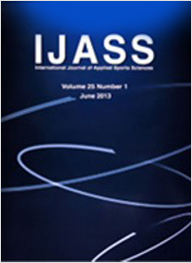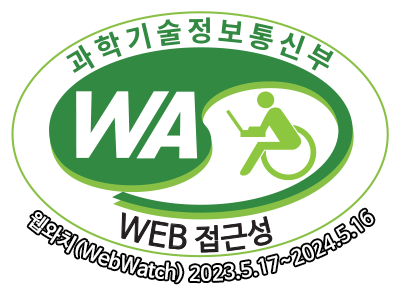-
연구자료
- 연구자료
- 한국스포츠정책과학원에서는 엘리트 선수들의 실력증진 및 경기력 향상을 위한 연구과제 및 실적 안내, 최신 체육정보 보급 및 우수 논문 소개 등을 하고 있으며,
정기적으로 3종의 간행물(스포츠과학, 체육과학연구, IJASS)를 발행하고 있습니다.
-
주요사업
- 주요사업
- 체육환경 및 체육정책의 일관성 있는 제도적 기반을 구축하고, 사회환경 변화에 적극 대처할 수 있는 정책 대안을 개발하고 체육과학의 가치와 전략을
새롭게 창조하며 스포츠과학을 체계적, 과학적으로 연구합니다.
-
체육정보
- 체육정보
- 효과적인 체력관리 및 성인병 관리, 신체 부위별 재활관리를 위해 운동 식사조절 지침을 제공하며 여러 가지 요인 별로 자세한 설명과 함께
체력증진 프로그램을 안내함으로써 상황 별 체력증진 및 재활지침에 관한 전반적인 정보를 제공해드립니다.
-
홍보광장
- 홍보광장
- 한국스포츠정책과학원에 관심을 가지고 계신 많은 분들을 위한 공지사항과 입찰정보, 행사안내와 같은 공고와 일정에 대한 정보를 담고 있으며
한국스포츠정책과학원의 공식 로고를 제공하고 있습니다.
-
고객광장
- 고객광장
- 전자민원과 고객의 소리, 자주하는 질문과 같이 한국스포츠정책과학원의 사이트를 이용하는데 불편사항이나 제안사항이 있을 시
이용할 수 있는 정보들을 담고 있습니다.
-
소개
- 소개
- 한국스포츠정책과학원은 역사와 전통, 풍부한 현장 경험과 폭넓고 깊은 연구역량을 보유하고 있습니다.이러한 역량을 결집하여 열린 눈으로 국민과의 눈높이를 맞추고,
열린 귀로 국민의 소리에 귀 기울이며, 열린 마음으로 국민의 마음에 다가감으로써 국민에게 사랑받는 연구원으로 자리매김하도록 노력하겠습니다.
-
스포츠과학지원
- 스포츠과학지원
- 한국스포츠정책과학원은 과학적이고 체계적인 방법으로 선수들의 경기력 향상을 위한 다양한 지원센터를 운영하고 있습니다.
선수들이 최상의 컨디션과 전략으로 경기를 치룰 수 있도록 지원하고 있습니다.
연구자료
- 연구자료 > 정기간행물안내 > IJASS
IJASS
「IJASS」는 2016년 한국연구재단 등재학술지로 선정된 체육종합 영문 학술지입니다.
- 창간 : 2000년 6월
- 발행일 : 매년 6, 12월말
- 한국연구재단 등재학술지
- 제30권 제1호(2018.6월)부터 전자저널(e-journal)로 발행됩니다.
- 2018년 이전 발간된 과월호는 한국스포츠정책과학원 도서관에서 열람 가능합니다.

논문투고안내
Manu Submission Guidelines
- IJASS 논문투고는 회원 / 비회원 구분 없이 무료로 논문 투고를 하실 수 있습니다.
- JASS의 논문마감일은 별도로 없으며, 수시 접수 받습니다.
Manus are invited on a variety of applied, theoretical, and empirical research on issues pertaining to the area of applied sport science, including (but not limited to):social and natural scientific approaches to sport.
The International Journal of Applied Sports Sciences follows the American Psychological Association (APA) publication style. Notes and references should appear at the back of the manus in separate sections. Manus normally should not exceed 30 single-sided typewritten pages with 1-inch margins. All text should be double spaced (including abstracts, references and notes). MS Word documents preferred. Contributors should include an abstract of no more than 100 words, as well as 4-5 keywords,on a separate page following the title page. The name(s) of authors should appear only on the title page. Contact information, including mailing address, hone and fax numbers, and e-mail address for each author must be provided on the title page. Manus submitted to the International Journal of Applied Sports ciencesshould not be under review elsewhere. Authors of manus accepted for publication in the International Journal of Applied Sports Sciences will be sent a more comprehensive style sheet to which they must adhere.
Contributors should submit their manu at this site: http://publ.sports.re.kr
Online Submission
Authors should submit their manus online. Electronic submission substantially reduces the editorial processing and reviewing times and shortens overall publication times. Please follow the hyperlink "Submit online" on the right and upload al of your manu files following the instructions given on the screen.
The review process
All submitted manus are read by the editor. Manus judged to be of potential interest to our readership are sent for formal review, typically to two reviewers. The editor then makes a decision based on the reviewers' advice, from among several possibilities:
Accept, when all two reviewers judge ‘accept’ with or without editorial revisions Reject, when all two reviewers judge ‘accept’ with or without editorial revisions Final Decision by the relevant area majored editorial board member, when all two reviewers judge ‘accept’ with or without editorial revisions
File on Objection Procedure
- Step1.The authors files on objection when they disagree the editorial decision.
- Step2.The editor ask to review the manu to a relevant editorial board member
- Step3.The editorial committee will be summoned to discuss the result reviewed by the relevant editorial board member.
- Step4.The editor provides resubmission opportunity when it is judged ‘reject’ or the editor assigns new reviewers when -the editorial committee judges that the objection acceptable
- Step5.The decision by the editorial committee will be sent to the authors.
Ethics approval of research
he IJASS aims to ensure that all articles published in its journals report on work
that is morally acceptable,
and expects authors to follow the World Association’s Declaration of Helsinki.
The research protocol must have been approved by the locally appointed
ethics committee and informed consent must have been obtained
from subjects (or their guardians).
Where there is doubt about research ethics approval,
the Editor may request copies of the correspondence between the authors
and the research ethics committee and may contact the Chair directly.
Scientific misconduct
There are differing definitions of scientific misconduct. We deal with these problems at the IJASS on a case by case basis while following guidance produced by bodies that include the Committee on Publication Ethics (COPE), the World Association of Medical Editors (WAME) and the International Committee of Medical Journal Editors (ICMJE).
WAME gives a useful overview of misconduct, using a slightly amended version of the US Office of Research Integrity definition of scientific misconduct and including these behaviors:
Falsification of data: ranges from fabrication to deceptive reporting of findings and omission of conflicting data, or suppression and/or distortion of data.
Plagiarism: The appropriation of the language, ideas or thoughts of another without crediting their true source and representation of them as one’s own original work.
Improprieties of authorship: improper assignment of credit, such as excluding others, misrepresentation of the same material as original in more than one publication, inclusion of individuals as authors who havenot made a definite
contribution to the work published or submission of multi-authored publications without the concurrence of all authors.
Misappropriation of the ideas of others: an important aspect of scholarly activity is the exchange of ideas among colleagues. Scholars can acquire novel ideas from others during the process of reviewing grant applications and manus. However, improper use of such information can constitute fraud. Wholesale appropriation of such material constitutes misconduct.
Violation of generally accepted research practices: serious deviation from accepted practices in proposing or carrying out research, improper manipulation of experiments to obtain biased results, deceptive statistical or analytical manipulations, or improper reporting of results.
Material failure to comply with legislative and regulatory requirements affecting research: including but not limited to serious or substantial, repeated, willful violations of applicable local regulations and law involving the use of funds, care of animals, human subjects, investigational drugs, recombinant products, new devices, or radioactive, biological or chemical materials.
Inappropriate behavior in relation to misconduct: this includes unfounded or knowingly false accusations of misconduct, failure to report known or suspected misconduct, withholding of information relevant to a claim or misconduct and retaliation against persons involved in the allegation or investigation.
Many journals, including the BMJ Journals, also include redundant publication and duplicate publication, lack of declaration of competing interests and of funding/sponsorship, and other failures of transparency to be forms of misconduct.
What we do at IJASS if we suspect such misconduct?
We take seriously all possible misconduct.
an Editor has concerns that a submitted article describes something that might be considered to constitute misconduct in research, publication or professional behavior, we may discuss the case in confidence with the IJASS Ethics Committee.
If the case cannot be resolved by discussion with the author(s) and the Editor still has concerns, s/he may report the case to the appropriate authorities. If, during the course of reviewing an article, an Editor is ed to possible problems (for example, fraudulent data) in another publication, the IJASS editor may contact the journal in which the previous publication appeared to raise concern.
- 논문편집양식 견본
1. SUBMISSION FORM
2. COPYRIGHT TRANSFER
-
- 표지는 별도로 작성하여 주십시오. : 표지에는 논문 제목, 저자 명, 소속 기관명, 제출일, 제출자 주소(주소, 전화, 팩스, 전자우편주소), 표제어 등을 기재하여야 합니다.
- 논문형식은 MS워드로 작성하여 주십시오.
- 논문은 영어로 작성되어져야 합니다.
- 1단 편집으로 제목구분을 분명히 하여 주십시오.
- 참고문헌은 APA스타일로 작성하여 주십시오.
- 그림과 표는 모두 논문의 끝에 별첨되어야 하며, 본문 중에는 그 삽입 위치가 표시되어 있어야 합니다.
| 담당자 | 이준호 | 전화 | 02-970-9570 | 팩스 | 02-970-9504 |
|---|








